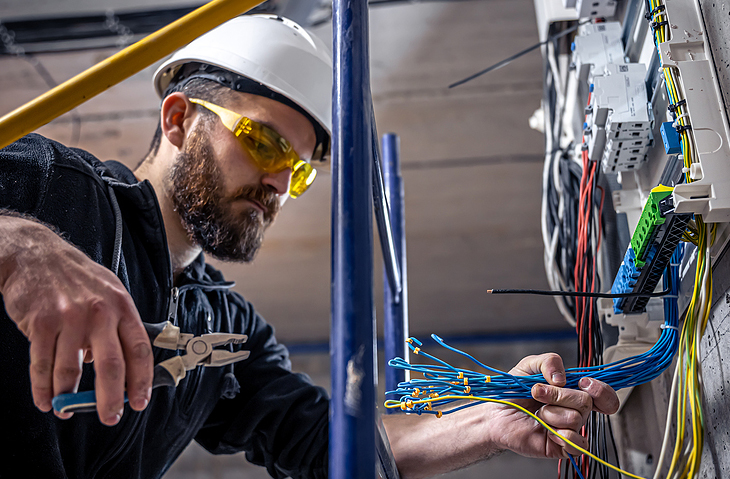In this career guide, I’m gonna teach you, how to become an electrician, including everything you need to know about electrician training and licensing requirements.

Electricians play a crucial role in modern life, requiring extensive training due to technical knowledge and risks involved. This article outlines how to become a licensed electrician.
Why Pursue a Career as a Electrician in 2023?
If you enjoy fixing things and solving problems with a methodical approach, electrician might be the perfect career for you. Qualified electricians have good earning potential, work in diverse environments, and rarely face job shortages.
The electrical industry offers fantastic opportunities, whether in specialized areas or starting your own business. Skilled electricians will always be in high demand.
What Does an Electrician Do?

Electricians are amazing trade professionals with a wide range of skills in handling electrical power. Their main job is to install, maintain, and repair all kinds of electrical equipment. They’re like the superheroes of electricity!
How Long Does It Take to Become a Electrician
Certificate programs at electrician trade schools usually take 4 months to 1 year. For an associate program at a community college, it’s about 2 years. After training, a 3-5 year apprenticeship is needed, shorter if you attended trade school.
Typically, 2 years as a journeyman is required before becoming a master electrician, taking 5-9 years in total.
How Much Does a Electrician Make?
The average salary for a electrician is $27.54 per hour in the United States and $9,438 overtime per year. 36.5k salaries reported, updated at July 26, 2023
Highest paying cities for Electricians near United States
- San Diego, CA $32.32 per hour
- Los Angeles, CA $29.49 per hour
- Kansas City, MO $27.41 per hour
- Houston, TX $26.70 per hour
- Atlanta, GA $25.54 per hour
- Norfolk, VA $24.60 per hour
- Orlando, FL $24.14 per hour
- Jacksonville, FL $24.09 per hour
- Tampa, FL $23.71 per hour
Electrician: Roles & Responsibilities
Installing, Maintaining, and Repairing Electrical Systems
Electricians are responsible for installing, maintaining, and repairing electrical control, wiring, and lighting systems in buildings and structures. This involves working from technical blueprints and ensuring the proper functioning of electrical fixtures and equipment to provide electricity for various purposes.
Reading Technical Diagrams and Blueprints
Electricians need to be proficient in reading and interpreting technical diagrams and blueprints. This skill is essential for understanding the layout of electrical systems and conducting installations and repairs accurately.
Performing General Electrical Maintenance
Electricians are tasked with conducting regular maintenance on electrical systems to prevent breakdowns and maximize electrical usability. This includes inspecting and replacing old wiring, cleaning circuits, and conducting routine checks to identify potential hazards or malfunctions.
Troubleshooting Electrical Issues
When electrical systems encounter problems or malfunctions, electricians are responsible for troubleshooting and diagnosing the issues. They use appropriate testing devices to identify faults and implement effective solutions to repair or replace damaged units.
Electrician: Skills & Qualifications
Technical Skills
Electricians must possess a range of technical skills to perform their job effectively and safely. These skills include the ability to install cables, conduits, tubing, and switching devices, use appropriate power tools, read and understand blueprints, and have a comprehensive understanding of procedures and electrical safety rules. Additionally, they should know how to repair or replace equipment, fixtures, and wiring.
Problem-Solving Skills
As an Electrician, one of the primary responsibilities is to diagnose and solve electrical issues. This requires strong problem-solving abilities, analytical skills to assess various situations, and critical thinking to determine appropriate solutions. Electricians must be able to read and analyze blueprints and schematics and diagnose electrical system malfunctions and failures.
Physical Skills
The role of an Electrician can be physically demanding, so candidates need to have good physical health and specific physical abilities. This includes the ability to lift and carry heavy objects, stand, bend, or crouch for extended periods, work from tall heights, climb ladders, scaffolding, or stairs, and perform electrical work in adverse weather conditions or temperatures
Knowledge of Safety Procedures and Regulations
Electricians must have a thorough knowledge of safety procedures and legal regulations to ensure the safe execution of electrical tasks. Understanding safety standards and guidelines is crucial for preventing accidents and maintaining a secure work environment.
Types of Electricians

Interested in becoming an electrician? With the correct training and knowledge, there’s a huge range of different career routes available for you to take. From working in homes as a domestic electrical installer to working on HV systems, the range of jobs available to electricians is vast.
Below are just a few examples of possible jobs you could take on when trained as an electrician:
Domestic Electrical Installers
Perhaps the most common type of electrician, domestic electrical installers work on domestic properties. So that’s small and larger jobs around the home, ranging from simple socket fixes to installation of wiring throughout a property.
Installation Electrician
You’ll be responsible for installing systems such as lighting, security, power, fire protection systems and structure cabling. This job is slightly larger in scope than a domestic electrical installer’s work, as it allows the possibility of working on larger projects. Installation electricians can work anywhere ranging from construction sites to commercial properties.
Maintenance Electrician
Maintenance electricians ensure that modern electrical systems and the equipment that they serve are always running effectively, safely and efficiently. This can involve anything from maintaining the power grid to fixing problems with machinery within factories.
Electrotechnical Panel Builder
They use programmable logic controllers and information technology to build and manage the electrical control panels that control buildings heating, ventilation, air conditioning and refrigeration equipment.
Instrumentation Electrician
This job involves commissioning, testing, fault finding and the repairing of building environmental control systems, such as large air conditioning units, heating and refrigeration.
Electrical Machine Repairer & Rewinder
Skilled electrical machine repair and rewind specialists are required to repair and maintain equipment machinery such as transformers, compressors, pumps and fans within buildings.
Highway Electrical Systems Electrician
Trained highway electrical systems electricians ensure that our street lighting, including traffic management systems are continuously managed and maintained to a high standard.
Where Do Electricians Work?
Residential Sector
Electricians are often employed in the residential sector, where they work in homes, apartments, and residential buildings. They are responsible for installing, maintaining, and repairing electrical systems in residential properties.
Commercial Sector
Electricians also work in the commercial sector, which includes offices, retail stores, shopping malls, restaurants, and other commercial establishments. They handle electrical installations and maintenance for lighting, power outlets, and other electrical systems in these commercial spaces.
Industrial Sector
Electricians are employed in the industrial sector, where they work in factories, manufacturing plants, and industrial facilities. In this setting, they are involved in handling complex electrical systems and machinery, ensuring smooth operations and safety compliance.
Construction Industry
Electricians play a crucial role in the construction industry. They work on new construction projects, installing electrical wiring and systems in buildings and structures during the construction phase.
Service and Maintenance Companies
Many Electricians work for service and maintenance companies that provide electrical repair and maintenance services to homes, businesses, and industries. They respond to service calls, troubleshoot electrical issues, and perform necessary repairs.
How To Become A Electrician (Step by Step guide)

To become a licensed electrician, you’ll need to follow these steps:
Step 1: Complete Basic Education (high school diploma)
While most of the jobs relies on industry-specific skills, there are also several academic concepts that electricians utilize on a daily basis. So it’s important you to complete your high school education and obtain a high school diploma.
Here are some school subjects that offer valuable skills for this career:
Electricians use math to calculate wiring length, current force, and circuit angles. They need physics knowledge for their work. Reading technical documents is common, so English skills are important. Shop and mechanical drawing classes help them design electrical systems in buildings.
Step 2: attend trade or vocational-technical school
While it’s not necessary to go to a trade or vocational-technical school to become an electrician, attending one can be really helpful and make a big difference in getting certified and finding a job. Whether you decide to go to a four-year university to study electrical technology or earn a career diploma from a trade school, you’ll get hands-on training in the lab and classroom. They’ll teach you the fundamentals and give you a solid introduction to basic electrical principles, which could give you an advantage when applying for apprenticeships.
Moreover, in many states and licensing areas, you can substitute some of the hours you spend in formal education for the on-the-job experience required to get your journeyman license. Usually, one year of formal education can count as 1,000 hours of practical experience. You’re allowed to substitute up to two years of training, which equals 2,000 hours. Some vocational-technical schools even offer a complete journeyman program that aligns with the local licensing requirements. These programs provide around 4,000 hours of on-the-job experience, which is about half of what you need to become a licensed journeyman.
Step 3: Apply for an apprenticeship program
You must finish an apprenticeship to become a licensed electrician. Here are a few ways you can start your journey as an apprentice in the electrical field:
- Trade schools: Consider enrolling in a trade school that offers hands-on training, apprenticeship programs, and assistance with job placement. These schools are a great opportunity to learn and grow.
- Union options: If you’re interested in joining a union, the Joint Apprenticeship & Training Committees (JATC) can help. With locations in major cities across the United States, JATC connects you with local union employers. You’ll receive classroom and lab-based training at their office. Please note that joining a union apprenticeship means joining the International Brotherhood of Electrical Workers (IBEW).
- Non-union alternatives: Joining a union is not mandatory, and you can explore non-union options as well. The Independent Electrical Contractors (IEC) and the Associated Builders and Contractors, Inc. (ABC) are two prominent organizations that offer apprenticeship programs with non-union electrical contractors. They have locations in many major cities.
As you embark on this journey, keep in mind that the application process may include a few steps. You might be asked to take an aptitude test evaluating your reading and math skills. Additionally, a job interview, a drug test, and specific physical requirements may be part of the process.
Wishing you the best as you pursue your apprenticeship and develop your skills in the electrical industry!
Step 4: Complete your apprenticeship program
Getting started in the field of electrical work requires a solid foundation of knowledge and experience. To become a licensed electrician, you’ll undergo a combination of structured learning, hands-on training, and guidance from a master electrician.
In most states, it’s necessary to complete a four-year apprenticeship program before being eligible to take the licensing exam. Throughout your apprenticeship, you’ll gain valuable insights in various areas, including:
- Understanding and interpreting technical diagrams and construction blueprints for electrical plans.
- Proficiency in installing, maintaining, and fixing electrical wiring and equipment used for electricity distribution.
- Adhering to national, state, and local regulations to ensure all work is conducted in compliance.
- Utilizing specialized tools and devices to meticulously test and inspect electrical systems, addressing any potential issues.
No matter where you are, the licensure requirements for electricians generally encompass:
- Dedicated classroom time ranging from 576 to 1,000 hours.
- Accumulating 8,000 to 10,000 hours (equivalent to four to five years) of on-the-job training, where you’ll apply what you’ve learned in real-world scenarios.
Throughout this journey, you’ll gain the expertise needed to succeed as a friendly, skilled electrician ready to take on exciting challenges.
Step 5: Get licensed or certified
Make sure to check out the licensing and certification requirements in your state or city – they can differ quite a bit! If a license is needed in your area, don’t worry, you’ve got this!
There might be an electrical exam, but no need to stress. It covers things like the National Electric Code, safety protocols, electrical concepts, and building codes.
Just show them the proof that you finished your apprenticeship, and you’re good to go!
Best of luck!
Levels of Electricians Based on Experience and Licensing

Journeyman electrician
A journeyman is the entry-level electrician. They finished an apprenticeship and got their license. They can work on their own but can’t train apprentices, lead a job site, or get permits for electrical work.
Master electrician
After gaining around two years of experience, a journeyman can apply to become a master electrician. Licensing usually involves passing an exam, with specific requirements differing by state. Master electricians have the privilege of leading jobs, providing training to apprentices, and overseeing electrical teams.
Independent electrical contractor
Electrical contractors are like small business owners. They hire electrician teams to do jobs. Contractors must have insurance and be a master electrician or have one on staff.
How to Find Electrician Jobs

Interested in an electrician career? Follow these steps:
- Attend training at a technical school for practical experience and classroom instruction.
- Seek an apprenticeship to learn from experienced electricians and enhance your skills.
- Earn a state license for safety and credibility.
- Prepare a tailored resume highlighting relevant experience and skills.
- Utilize networking to find job opportunities and gain referrals.
- Apply for entry-level positions to start your career and grow professionally.
Tips for applying to electrician jobs
If you’re interested in a career as an electrician, follow these tips to find work:
- Research potential employers to understand the company and tailor your responses during interviews.
- Seek certifications to stand out from other applicants (e.g., Certified Electrical Inspector, Certified Lighting Consultant).
- Highlight essential skills like attention to detail, math, communication, teamwork, and electrical expertise.
- Practice for interviews and demonstrate your practical skills during mock interviews.
- Send a follow-up message after applying to stay on the employer’s radar.
- Have a career plan to target opportunities that align with your goals (e.g., independence or long-term stability).
How to Become a Electrician Without a Degree?

To become an Electrician without a degree, individuals can follow a straightforward path. Firstly, they should obtain a high school diploma or GED, with relevant subjects like algebra and physics being beneficial. While not mandatory, attending a trade or vocational school can provide valuable training, preparing them for an apprenticeship.
They can then apply for an apprenticeship through trade schools or organizations like Independent Electrical Contractors or Joint Apprenticeship & Training Committees (JATC). During the apprenticeship, which typically lasts around 4 years, they will receive on-the-job training, classroom instruction, and mentorship from experienced Electricians.
After completing the required training hours, they can take their state’s Electrician license test to obtain licensing, opening up job opportunities in the field
Best programs to Become a Electrician in USA
There are many courses and programs that can help you become an electrician in the USA, depending on your level of experience and interest. Some of the best courses to become an electrician in the USA are:
- Trade schools or vocational-technical schools that offer electrician certificate or career diploma programs. These are short-term programs that can be completed in a few months to a year. They provide hands-on training and practical skills for entry-level electrician jobs. You can also earn credits that can be transferred to a higher degree program later. Some examples of trade schools that offer electrician programs are Florida International Training Institute, Orleans Technical College, or Fox Valley Technical College.
- Community colleges or four-year schools that offer associate’s degree in electrical technology or engineering. These are two-year programs that combine general education courses with technical courses in electrical theory, circuits, wiring, codes, and safety. They also prepare you for the licensing exams required by most states. Some examples of community colleges or four-year schools that offer electrician degrees are Michigan State University, [Paris Junior College], or [Ivy Tech Community College of Indiana].
- Technical colleges that offer electrician apprenticeship programs. These are four-year programs that combine classroom instruction with paid on-the-job training under the supervision of a licensed electrician. They cover all aspects of the trade, from installation to maintenance, and allow you to earn while you learn. You also get the opportunity to work on various projects and gain experience in different settings.
>>Learning Resources:
Frequently Asked Questions About Becoming A Electrician
Which states require electricians to be licensed?
In about 41 out of 50 states, electricians need to be licensed to work. A few exceptions are Louisiana, Mississippi, and Ohio, where contractor licenses are required instead. But guess what? In Indiana, Illinois, Kansas, Missouri, New York, and Pennsylvania, no specific licensing for electricians is needed. Keep it simple!
What are the certification levels for electricians?
States have different certification levels for electricians. Usually, there’s a journeyman level and a master electrician level. To get licensed at each level, applicants need to meet experience requirements and often pass a test. Simple as that!
How much does it cost to become an electrician?
The cost of training can differ based on the program’s length and duration. On average, tuition and fees at two-year public schools in 2019-2023 were around $3,800, as per the National Center for Education Statistics.
For those aiming to become electricians, attending trade schools, vocational schools, technical schools, or community colleges is common. Through an apprenticeship program, they gain on-the-job experience. The good news is that many schools offer financial aid options to help with training costs. It’s all about finding the right path for you!Are there online electrician programs?
Lots of colleges provide online electrician training courses. These courses help you grasp the National Electric Code and learn the skills required to become a licensed electrician. Some programs even help you find an apprenticeship.
Final Thoughts
Remember, this guide serves as a starting point, and your determination, passion, and commitment will be the driving forces behind your success. Best of luck on your journey to becoming a highly skilled and sought-after electrician!

